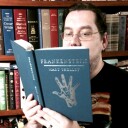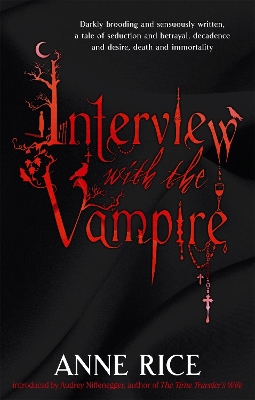
From #1 New York Times bestselling author Anne Rice, this sensuously written spellbinding classic remains 'the most successful vampire story since Bram Stoker's Dracula' (The Times)
In a darkened room a young man sits telling the macabre and eerie story of his life - the story of a vampire, gifted with eternal life, cursed with an exquisite craving for human blood.
When Interview with the Vampire was published, the Washington Post said it was a 'thrilling, strikingly original work of the imagination . . . sometimes horrible, sometimes beautiful, always unforgettable'. Now, more than forty years since its release, Anne Rice's masterpiece is more beloved than ever.
***The Vampire Chronicles is now a major TV show***
Also in the Vampire Chronicles:
The Vampire Lestat
The Queen of the Damned
- ISBN10 0751541974
- ISBN13 9780751541977
- Publish Date 16 October 2008 (first published September 1976)
- Publish Status Active
- Out of Print 11 March 2022
- Publish Country GB
- Publisher Little, Brown Book Group
- Imprint Sphere
- Format Paperback (B-Format (198x129 mm))
- Pages 320
- Language English
Reviews


Michael @ Knowledge Lost
I first read Interview with the Vampire when I first got into reading and really enjoyed it. In that review I gave it high praises, saying, “The whole story is almost philosophical in the way it tells the struggle of Louis and his moral conscience…[A] battle of good and evil is played out in a more evil orientated world… It doesn’t feel forced or predictable it just leaves you thinking how wonderfully complex these characters are.” Looking back on that review with a fresh re-read and five more years of reading experience, I have a very different opinion.
First of all, the vampire mythology is an interesting literary device to explore morality. Looking back on the mythology, all the way to classics like Dracula; novels continue to explore the morality of a powerful vampire sucking the life away from the innocent. What gives them the right to life over everyone else? There is a conflict between morality and the idea of survival. Within Interview with the Vampire it does this in two distinct ways; first you have Lestat who takes life without a care in the world, following the instincts of survival. While Louis is often questioning his survival and the moral implications, often hating what he has become.
The novel spans the life of Louis for the past two hundred years, though Interview with the Vampire is just over 300 pages. For me this becomes the biggest downfall of the book, and the character development, especially the psychological, suffers. There are a lot of interesting topics that this novel could have explored but we never get the opportunity to do so in great detail. Take for example, Claudia; she has many years to live and learn about life, and this could have made for a far greater story. The struggles Claudia went through would have been fascinating, especially the sexual development of a girl stuck in a five-year-olds body.
It is interesting to see how much a few years has changed my view on literature; I feel like I am developing some useful skills to analyse the books. I also feel like I am getting to the point where I am starting to feel like I am ‘well read’ (although there is a long way to go). Having experienced more with the vampire mythology and literature in general, I am enjoying going back to some of the books I read more than five years ago. Sometimes I do not enjoy the novel as much, like I did this time, but other times I find a new found respect for what an author was trying to do (see a future review of The Handmaid’s Tale). Interview with the Vampire could have been so much more, and now I just wish it was.
This review originally appeared on my blog; http://www.knowledgelost.org/literature/book-reviews/genre/gothic/interview-with-the-vampire-by-anne-rice/

celinenyx
The story starts off fine. Louis gets introduced, Lestat makes a grand entrance and the vampire is made. Then you get the Louis is very different blahblahblah, and then he starts to hate Lestat. That's fine. But then he starts to think that he is evil, vampires are evil, they might be children of the devil, and that really gets on your nerves after fifty pages. And even more after a hundred pages.
And then Lestat leaves the scene. And Louis continues to whine. You would think after he few centuries he would get over his self-pity, but guess again! Also, he just isn't vampire enough. He's weak, both mentally and physically, and his favourite way of handling problems is by running away or just scream "NO!". He actually behaves himself like a very stupid, strange and self-pitying human.
That being said, I think the side characters (Claudia, Lestat, Armand) were very enjoyable and interesting. The vampire lore is of course well-known but not boring and doesn't feel repetitive.
And in the end, everything gets turned around, and I found the conclusion quite satisfying.
Shame of that poor Lestat though, but he has still some books to go, so I guess he'll redeem himself.

Whitney @ First Impressions Reviews
Interview with the Vampire had been recommended to me by several friends and picked up at my latest trip to the public library. I immediately became engrossed in this novel and was transported to 18th-century Louisiana. Anne Rice's descriptions on a vampire's day-to-day or night-to night life were fascinating; from the transformation to mortal to immortal, the nightly hunt of human blood or the loneliness that occasionally comes with the territory made Interview with the Vampire hard to put down.
The Vampire Louis, who is giving the interview leaves nothing off limits and makes you feel compassion rather than disgust for his unnaturally long life; and realizes that in hindsight this is not the life he would have chosen.
Lestat who is Louis's maker, who while the reader should feel a dislike for as he has uncaring personality for those around him and can be very selfish as a whole, but there is something about "the bad boy" and I grew to care for him despite his faults.
Claudia, who was taken form a mortal life at the age of five is very resentful of the life she could of had as she is forever in a child's body while her mind grows to that of an adult's and longs for a woman's body to match. While sympathy is felt Claudia also has a rebellious streak who believes that the sucking of blood is one big game and in truth does not care deeply for any soul, including herself.
I thought the ending to be a great close, but again overshadows the beginning of a new story. The story of the boy who interviewed him in the first place! I thought it was ironic, and very foolish for the boy to feel such a blood curling need for immortality after all he had heard. Like Louis says: "This... after all I told you... is what you ask for?"
I feel what Louis felt then; the desperation and the anger that even after all the wrongs of his life he told him, after all the death and all the sadness his existence had brought upon him, that he still wanted it. It is ironic because the boy will search for Lestat, and the story will most likely repeat itself. Obviously not in the same way, but he will somewhat experience what Louis went through.
This is a beautifully written book. Anne Rice is truly a remarkable storyteller.

